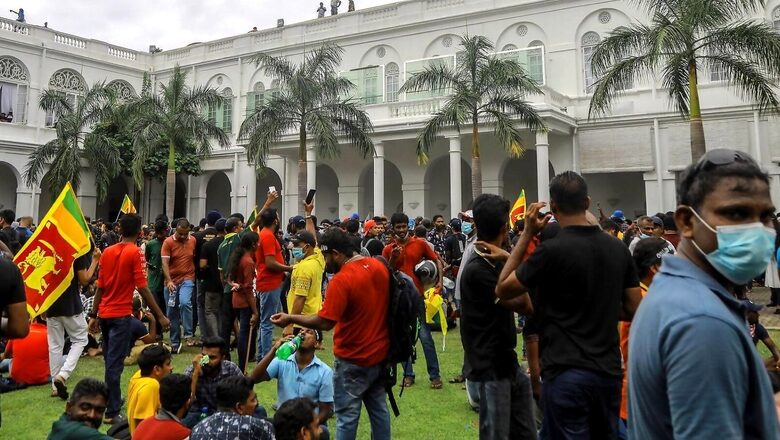
views
There is no parallel in the South Asian region to what happened in Sri Lanka over the weekend even if nations like Pakistan and Bangladesh had experienced prolonged popular protests, egged on by the political Opposition, against the government leadership of the day. On Saturday, 9 July 2022, exactly 60 days after the people’s ‘struggle’, or ‘Aragalaya’ in Sinhala, had forced the exit of Prime Minister Mahinda Rajapaksa, people from across the country gathered in Colombo and swept into the Presidential Secretariat and the President’s official residence, ’Temple Trees’, forcing incumbent Gotabaya Rajapaksa, the nation’s most hated man just now, to take refuge in the armed forces, whose supreme commander he still is.
Across the board, political parties met under Parliament Speaker Mahinda Yapa Abeywardena, to resolve that both the President and also the equally discredited Prime Minister, Ranil Wickremesinghe, quit, to help form an ‘interim government’ with an ‘interim’ President and ‘interim’ Prime Minister, pending parliamentary polls within six months, or less than three years ahead of schedule. The Speaker, after communicating with Gota, has since announced that the President would resign put on Wednesday, the proverbial 13th.
Such a construct assumes that the proposed non-existent dispensation — and there are no names yet on the table — would be able to muster the required numbers. The Second Republican Constitution of 1978 provides for the Prime Minister to assume the presidency when there is a vacancy and have Parliament elect a stand-in for the residual period, or until the second half of 2024, as is the case for ‘outgoing’ Gota. When both the presidency and the prime minister’s job fall vacant simultaneously, the Speaker assumes the presidency and goes through the process.
At present, political party leaders opposed to the Gota-Ranil combo have resolved on the second option.
Parliament elects a ‘residual’ President by a simple majority. But for Parliament to usurp the powers of the President to dissolve the House and order fresh elections any time before six months ahead of the due date, it would require a two-thirds majority. Both changes will become possible if either the Rajapaksa-controlled Sri Lanka Podujana Peramuna (SLPP) grudgingly support such a scheme, or there is a massive rift in the party’s parliamentary group. If the SLPP group remains undivided as until last Friday, they would still hold the key to all changes that are being talked about. That could be problematic after Saturday’s uprising.
Sixth in a row
It’s the sixth in a row of incomplete terms for Prime Minister Wickremesinghe. The complexity of the man was a contributing factor. It’s so for the entire United National Party (UNP), the nation’s GoP, ditching his leadership in favour of forming a breakaway outfit, Samagi Jana Balawegaya (SJB), or ‘United People’s Power’. In the 2020 parliamentary polls, the SJB won 54 seats of 225 while the UNP could not win a single ‘elected seat’.
The UNP parent had to settle for a lone ‘National List’ seat, which in a way is a constitutional charity, based on the total vote-percentage. Once the party’s tallest leader, Wickremesinghe had to fight out with competition to get himself nominated for the ‘National List’, with the result, he entered Parliament only months after its formation and commencement of functions.
Yet, if he was preferred for replacement Prime Minister after Gota had to ‘sacrifice’ elder brother, political mentor and two-time President, Mahinda R, to save his own seat, against mounting popular unrest, it owed to the belief that Wickremesinghe was the blue-eyed boy of the West, and would be able to fast-track the critically-required economic assistance from the West, and also the IMF, before the first tranche of Indian aid in food, fuel and medicines ran out.
Secondly, as the nation’s most experienced parliamentarian with 45 years of legislative performance and five prime ministerial innings behind him, Wickremesinghe was also believed to be the ‘man of the hour’. Neither happened, as the SJB Opposition in particular continued to taunt him on his being a one-man parliamentary group, and having to depend on the one-time SLPP rival of the discredited Rajapaksas to stay on in office.
On Saturday, after protestors had occupied the President’s Secretariat and were taking a joy-swim in the pool of the official residence, Wickremesinghe did hold talks with other political parties about the future. He had possibly hoped to replace Gota and take his place through a parliamentary vote, too. The SJB as the single-largest non-SLPP party won’t attend Ranil’s meeting. Others too won’t have Ranil, as became known at the meeting convened by the Speaker at Wickremesinghe’s instance.
Vow by fire
Despite the Speaker’s announcement about the twin-exits, there is no official confirmation from Gota or Wickremesinghe about the same. If Gota is expected to quit on 13 July, Wickremesinghe had reportedly offered to quit when the rest are ready with an ‘all-party alternative’.
While their offers may be genuine, any alternative government, under a new President and/or Prime Minister needs the endorsement of a substantial number of parliamentarians from the present-day ruling party, whether or not they continue as a group. There will be a lot of tussles within the divided Opposition on the choice of common candidate for both posts. SJB’s Leader of the Opposition, Sajith Premadasa, who, given the chance, would like to have both positions to himself.
Others may not want him as President but Premadasa, Jr, son of the LTTE-slain father, Ranasinghe R, may accept nothing less. Such anticipation has already given room for speculation if the Gota-Ranil duo would actually be called upon to quit, or if the latter may have a chance. There are now unconfirmed reports that Gota has taken control (from wherever he is secure/hiding) and has instructed officials on the distribution of a new shipment of imported fuel. Wickremesinghe too has reportedly listed out the multiple aid, credit and debt-restructuring plans that he had put in place, but with an add-on that he would not want to stand in the way if a new government could take over all that from where he had left.
The belief is that the Saturday evening gutting of Wickremesinghe’s private residence in Colombo, with the arsonists not giving the Fire Service vehicles road-space to reach the place and douse the flames, was a message for him not to play a double-game at this late hour. It is as if it were a vow by fire for the political class to remember for a long, long time to come.
Coming as it did after the arsonist-attack on the homes of 78 ruling party politicians from President Gota and the rest of the family, all across the Sinhala South on the evening of 9 May, hours Mahinda Rajapaksa quit as Prime Minister, yet another gutting episode was also seen as a fresh warning to ruling SLPP parliamentarians to ‘behave’ and not become ‘adventurous’ all over again.
Military made it happen
No one has given adequate credit to the nation’s uniformed services, comprising the armed forces and the police, who made it all happen, by staying neutral, or more than neutral, in favour of the ‘people’s struggle’. Seemingly more out of conviction than anticipating additional reprimand from the West on allegations about their past behaviour, especially during the decisive ‘Eelam War IV’, the uniformed services did not do anything that would have jeopardised the protestors’ plans to storm capital Colombo, whether in the past or more so on Saturday last.
The armed forces especially have been a bogeyman for the anti-Rajapaksa groups in the country, and the Western world, for reasons yet to be explained convincingly. But through the past weeks, the armed forces have proved one more time that they are as professional as they come in any Western democracy, especially when compared to the conduct of the US-NATO personnel in Afghanistan and Iraq in recent years.
Accompanied by the tri-Services chief, Chief of Defence Staff, Gen Shavendra Silva has since urged ‘all citizens to give their support to the armed forces and the police in order to maintain peace in the country’. Whether it was an appeal or a warning for the mostly-peaceful protestors not to resort to arson, as happened on 9 May and July, or other violent methods, will be dictated by the field conduct of a section of the protestors who have reportedly declared that they would continue to ‘occupy’ the President’s residence and Secretariat until Gota and Ranil had quit — paving the way for what they claim will be and will have to be a ‘new dawn’!
The next few days are as crucial for deciding the future of the nation’s politics as the past many weeks. On the political stability that the nation would guarantee itself, quick and early, would also remain the new opening for a speedy injection of IMF bail-out and subsequent aid and assistance from the West — adding to what the Indian neighbour (alone) has been pumping in, with hopes of additional injection of aid until a broader aid-programme presents itself!
The writer is a Chennai-based policy analyst and commentator. Views expressed are personal.
Read all the Latest News, Breaking News, watch Top Videos and Live TV here.




















Comments
0 comment